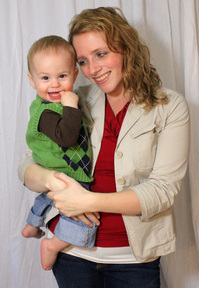In the Fall of 2012, I had the unfortunate experience of finding myself crouched in the corner of a bathroom in Mahoney Hall, trying to maintain some level of privacy, while I pumped breastmilk as quickly as possible during a class break. While I was tucked under the sink, I thought to myself, ‘No one should ever have to use this as a last resort.’ The moment inspired me to look more closely at the experience of parenting students, both at UML and more broadly.
The National Center for Education Statistics reports that 50% of nontraditional undergraduates (which themselves make up 56% of the entire population of college students) are either parenting or currently pregnant. Parenting students have doubled their enrollment in 4-year universities over the last 20 years.
Unsurprisingly, enrollment is not evenly distributed between mothers and fathers. Significantly more single mothers are enrolling compared to single fathers (17% of all undergraduates compared to 8% respectively), a phenomenon that intersects with other issues, like socioeconomics and race. Women with dependent children represent the largest poverty sector in the US. Almost 60% of low-income women students are single mothers. Increasingly, parents, particularly single mothers, are seeking four-year degrees rather than two-year degrees, especially in Massachusetts. In Massachusetts in 2005, an associate’s degree netted an additional $8,154 of income; a bachelor’s degree resulted in an additional $18,346 per year. This earnings gap is particularly critical in Massachusetts, where the estimated required annual income to support two dependent children is $65,880.
But in the absence of proactive University policies to support parenting students, they have some of the poorest academic outcomes; 60% of parenting students will withdraw before graduation according to the National Center for Education Statistics. That’s almost double the non-parenting student withdrawal rate. Average 6-year graduation rates for all undergraduates are about 29%, but for single parents, that number is just 5%.
In the fall of 2013, in conjunction with the Center for Community Research and Engagement, Professor Robin Toof and I launched an effort to explore the size and needs of the UMass Lowell parenting student population. In two weeks, 197 parenting students from UMass Lowell completed our survey. Most participants were full-time undergraduate students (35%), followed by part-time graduate students (31%), full-time graduate students (20%), part-time undergraduate students (7%), continuing education students (5%) and other (2%). Importantly, these results dispel a common assumption that parenting students are primarily part-time or graduate students.
We also discovered that while most participants reported having just one child under the age of 18 (52%), nearly one quarter (22%) of participants reported having 3 or more dependent children, and 35% of participants have at least one child under age four. These findings suggest that our parenting students are highly likely to have a need for childcare other than public schooling.
We also asked participants to rate their experience with access to and quality of resources, sense of community, and overall experience. A significant majority (91%) of participants disagreed that they understood the types of services available to them; 86% disagreed that they would know who to talk to if they needed help with school-life balance. Only 11.9% of participants believe that the University provides adequate support services to parenting students.
67% of parenting students disagreed that they had connected with other parenting students; nearly 60% disagreed that they felt connected to the broader UML community; and nearly 50% disagreed that they felt comfortable bringing their children to campus events.
Despite this, 67% of participants reported that, overall, their experience had been positive, and 77% reported being confident they would complete their academic goals on time.
The results suggest a strong need to address issues of resources and integration for parenting students, two factors that are highly correlated with academic success. Written comments echoed these issues. One participant wrote, ‘Before taking this survey I knew nothing of support for parenting students.’ Another commented, ‘The school is very friendly and a wonderful academic environment, but I will admit that as a student and parent it’s a little lonely, especially [as] nontraditional students.’ The challenge of breastfeeding was repeated by several participants, with one writing, ‘I feel it is degrading that I have to pump in the bathroom’the bathrooms [in my building] don’t have an electric outlet for my pump machine.’ Another asked for ‘cozier’ lactation rooms. Several respondents expressed the need for information about childcare; the request for on-site childcare was also repeated.
A university like UMass Lowell is particularly poised to answer this challenge. As a state university, we have a commitment to educational efforts that reflect the best interests of our community. In Lowell, 66% of households living below the poverty line are headed by single mothers. Increasingly, these mothers are seeking higher education as a pathway out of poverty. Public institutions in particular have a responsibility to meet the growing demand for parent-friendly policies that serve the economic interests of their constituents.
To spearhead this effort, I am proposing to organize parenting students and their allies in the effort to promote a parent-friendly campus culture at UMass Lowell. A coordinated effort between students, faculty, staff, administrators and community stakeholders is the most effective means of leveraging resources and accomplishing goals that are both feasible and high-impact. If you are interested in this effort, please contact me at Hannah_tello@student.uml.edu.
Written by: Hannah Tello

